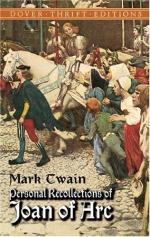“I will give you a sign, and you shall no more doubt. There is a secret trouble in your heart which you speak of to none—a doubt which wastes away your courage, and makes you dream of throwing all away and fleeing from your realm. Within this little while you have been praying, in your own breast, that God of his grace would resolve that doubt, even if the doing of it must show you that no kingly right is lodged in you.”
It was that that amazed the King, for it was as she had said: his prayer was the secret of his own breast, and none but God could know about it. So he said:
“The sign is sufficient. I know now that these Voices are of God. They have said true in this matter; if they have said more, tell it me—I will believe.”
“They have resolved that doubt, and I bring their very words, which are these: Thou art lawful heir to the King thy father, and true heir of France. God has spoken it. Now lift up they head, and doubt no more, but give me men-at-arms and let me get about my work.”
Telling him he was of lawful birth was what straightened him up and made a man of him for a moment, removing his doubts upon that head and convincing him of his royal right; and if any could have hanged his hindering and pestiferous council and set him free, he would have answered Joan’s prayer and set her in the field. But no, those creatures were only checked, not checkmated; they could invent some more delays.
We had been made proud by the honors which had so distinguished Joan’s entrance into that place—honors restricted to personages of very high rank and worth—but that pride was as nothing compared with the pride we had in the honor done her upon leaving it. For whereas those first honors were shown only to the great, these last, up to this time, had been shown only to the royal. The King himself led Joan by the hand down the great hall to the door, the glittering multitude standing and making reverence as they passed, and the silver trumpets sounding those rich notes of theirs. Then he dismissed her with gracious words, bending low over her hand and kissing it. Always—from all companies, high or low—she went forth richer in honor and esteem than when she came.
And the King did another handsome thing by Joan, for he sent us back to Courdray Castle torch-lighted and in state, under escort of his own troop—his guard of honor—the only soldiers he had; and finely equipped and bedizened they were, too, though they hadn’t seen the color of their wages since they were children, as a body might say. The wonders which Joan had been performing before the King had been carried all around by this time, so the road was so packed with people who wanted to get a sight of her that we could hardly dig through; and as for talking together, we couldn’t, all attempts at talk being drowned in the storm of shoutings and huzzas that broke out all along as we passed, and kept abreast of us like a wave the whole way.




